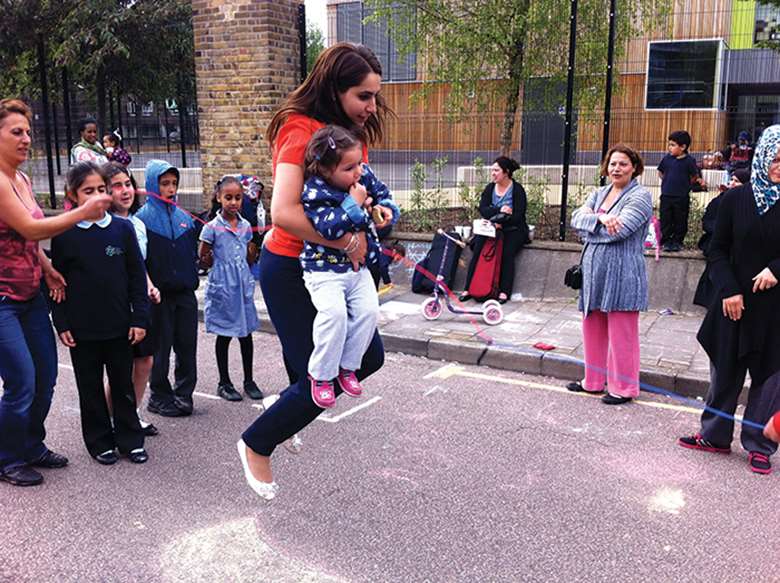Hackney Play Streets
Emily Rogers
Wednesday, May 31, 2017
Hackney Council-funded Play Streets project has involved 40 streets being closed for play since September 2012.

- A £55,000 grant from Hackney Play Association has funded a Play Streets co-ordinator and support officer to help residents through the process of closing roads
- The street play movement, started by Bristol organisation Playing Out, has led to at least 475 streets being closed in 38 local authorities
ACTION
In 2009, two Bristol mothers decided to apply for a road closure order to enable children to play freely in their street, then helped neighbouring streets do the same. They produced a film and website to inspire others, launching the organisation Playing Out in 2011.
Hackney Play Association (HPA) director Nicola Butler found herself "blown away" by the Playing Out film's portrayal of the joy and simplicity of street play. So she invited the Bristol team to speak at the 2011 East London Play Conference. "I was very keen to support this in Hackney, but didn't want to just parachute in as the play association and start imposing it," she recalls. She didn't have to. The film had also inspired Hackney mother-of-three Claudia Draper, who sought Butler's help in getting her road closed regularly for play.
Butler says Hackney Council's support for the play association across key departments including parks, transport and its youth service Young Hackney has helped maintain a culture of play in the borough, which has seven staffed adventure playgrounds. She remembers the authority getting on board with the street play idea "really quickly" and after a summer of 2012 Olympics street parties, started a year-long play streets pilot, providing the paperwork enabling residents to close their roads regularly for play. The authority also funded HPA to employ Draper as Play Streets co-ordinator, supporting residents to get street play off the ground.
HPA's annual £55,000 play streets grant from Hackney's public health department also enabled the recruitment of support officer Allison Vitalis in June 2016. After being contacted by residents, Draper or Vitalis talk them through the process. They may also help with initial door knocking; residents need to show support through a petition form, ideally signed by the majority. "They're trying to allay fears and objections, like reassuring neighbours they'll still be able to drive in and out if needed, and reassuring older residents that they're welcome to join in too; it's not just for children," explains Butler. "Hackney Council has been robust in taking the view that it is not going to let a small number of vocal objectors go against the majority's wishes."
Hackney Council runs a rolling programme for street play applications, with four deadlines throughout the year. There is a lead-in time of around three months; traffic regulations require it to advertise road closures twice in a local paper, at least a month apart. Sessions are usually monthly, and last two hours. They tend to involve free play rather than structured activities; including bikes, scooters or simple play equipment such as skipping ropes, hoops or chalk.
There are now 40 Hackney play streets and 200 sessions took place last year, involving around 1,400 children. Seven Hackney schools also close the road outside for play at the end of each term and a children's centre, homeless families centre and a church have also participated. HPA has also worked with six housing estates to introduce play sessions in the roads or communal space outside, generally facilitated by HPA playworkers, who provide play equipment.
Councillor Feryal Demirci, Hackney cabinet member for neighbourhoods, transport and parks, sees play streets as an important part of the council's drive to make neighbourhoods safer, healthier and more "liveable", improve children's health and create closer-knit communities. The Department of Health (DH) acknowledged street play's health benefits in 2013 through a three-year grant of just over £1m, enabling a partnership of Play England, Playing Out and London Play to provide advice, support and resources, helping at least 475 streets close in 38 local authorities.
IMPACT
A 2012 University of Bristol study, which involved electronically monitoring the activity levels of 66 children during after-school street play on two Bristol streets, showed them to be outside for 70 per cent of the road closure, compared with 20 per cent outdoors during an average school day. They spent 30 per cent of this period in "moderate to vigorous physical activity", compared with an estimated five per cent when indoors. The university's evaluation of the 2013-16 DH-funded street play project, expected later this year, will show similar findings, as well as an increase in community cohesion.
A February 2015 evaluation of Hackney Play Streets by play expert Tim Gill, commissioned by the council's Get Hackney Healthy board, shows strong consensus among participants about street play's benefits, particularly in increasing children's play freedom and increasing social interaction.
Vitalis says initiating street play in her road in 2013 built a sense of belonging and security for her and her two children, after her move from a social housing estate left her feeling isolated. "It was a really good way for my children to be included in the neighbourhood," she recalls. "Now I have many friends on this street and we all look out for each other. It's made a big impact on my daughter, because she knows everybody."




